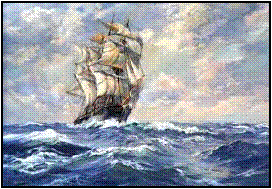Went to the monthly SWAP-NE (local songwriter’s group) and enjoyed an evening discussing ways to present and market songs (and performers) by Steve of Fools Gold. In the second half we all shared songs we’d written and I played ‘Ship Ahoy’, a song taken from a poem by Herbert Asquith called, ‘A Sip Sails Up To Bideford’. I suggested at the next meeting we could bring along poems to similarly convert into songs.
Some may call it plagiarism, or simply cheating, but artists have always been inspired by others’ works. Bob Dylan has certainly borrowed heavily from other people, both lyrics and melodies, or words and phrases from books and magazines, etc. Famously, Dylan copied Dave Van Ronk’s version of ‘House of the Rising Son’ without permission for his first album, only informing him after the event (putting great strain on their friendship). Nor was this the last time Dylan was accused of song theft.
However, one could say Dylan was only doing what folk singers have always done – especially in the oral tradition – of adapting and changing existing material. The main difference being that most folk singers make little or no money from the process (unlike Mr D). Woody Guthrie, for example, when someone (it may have been Pete Seeger) informed the great man another singer was performing one of his songs and claiming authorship, retorted with a laugh that he could hardly complain as he was himself ‘the greatest song thief of all time’. Personally, I only began borrowing from poems when, on one occasion, I had come up with a tune but could not think of any appropriate words. In desperation I started flipping through an anthology of children’s poems (The Book of a Thousand Poems, published by Evans) and found ‘A Ship Sails Up To Bideford’ which had something evocative about it and seemed to fit. I had to alter the original in various ways; simplify the language and structure to become singable and also to add a chorus. I have since used a number of other poems in a similar way – sometimes changing very little and other times a lot (recently I tried to write a song from a poem about Billy The Kid and, despite lots of research into the real character, ended up using only the title (nevertheless it was a good starting point).
Pop music has, of course, been sampling extracts from others’ material for some time. I don’t know the legal position but I believe it’s customary to get approval and negotiate a fee. With regards poems I assume it depends if copyright is still valid (void after 50 years?). Anyway, below is ‘Ship Ahoy’, my song adapted from ‘A Ship Sails Up To Bideford’. Its unusual for me to write a descriptive song with no narrative, but there still seems to be a kind of forward motion about the song – a kind of desire to know what the ship may bring.
SHIP AHOY Key: F
C. Look to the far horizon, sailing before a western breeze.
Mast by mast, and sail by sail, a ship is rising from the seas.
Ahoy there! Ship Ahoy! x2
1. She comes from Eastern islands, the sun shining on her hold.
Bearing the fruits of Jaffa; dates, oranges and gold.
2. She’s bringing fine silk from China, and bales of Persian dyes.
Birds with sparkling feathers, and snakes with diamond eyes.
3. Gliding along like starlight, as white as any gull,
With hints of mystical promise, in the shadow of her hull.
A SHIP SAILS UP TO BIDEFORD
A ship sails up to Bideford;
Upon a western breeze,
Mast by mast, sail over sail,
She rises from the seas,
And sights the hills of Devon
And the misty English trees.
She comes from Eastern islands;
The sun is in her hold;
She bears the fruit of Jaffa,
Dates, oranges and gold;
She brings the silk of China,
And bales of Persian dyes,
And birds with sparkling feathers
And snakes with diamond eyes.
She’s gliding in the starlight
As white as any gull;
The east is gliding with her
In the shadows of her hull.
A ship sails up to Bideford;
Upon a western breeze,
With fruits of Eastern summers
She rises from the seas,
And sights the hills of Devon
And the misty English trees.
By Herbert Asquith (1881 – 1947) English poet, novelist and lawyer.
Second son of H.H. Asquith, British Prime Minister (Liberal)

